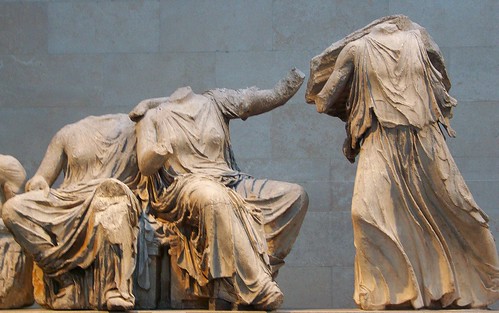Beyond the Elgin Marbles: Which other famous artefacts has the UK been urged to give back?
Elgin Marbles #ElginMarbles

Greece has long called for Britain to hand back the Elgin Marbles – 17 sculptures controversially removed from the ancient Parthenon temple 200 years ago.
UK officials have discussed legal ways they could block any export of the sculptures, Sky News understands, as Downing Street cancelled a meeting between Prime Minister Rishi Sunak and his Greek counterpart.
But Greece is not alone in demanding the return of artefacts held by British museums.
Here, Sky News looks at some of the other countries calling for the UK to hand back precious items.
Benin Bronzes – Nigeria
Image: Benin bronzes on display at the British Museum
Nigeria has called for the return of the Benin Bronzes – and renewed its demand after it emerged earlier this year that 2,000 artefacts had been stolen from the British Museum.
The artefacts, which date back as far as the 16th century, were taken from Benin City after British forces invaded the Kingdom in modern day Nigeria in 1897.
“They are the subject of loot. They were illegally taken out of the country,” said Abba Isa Tijani, director of Nigeria’s National Commission for Museums and Monuments, speaking to Sky News in August.
“It is irrespective whether they are safe there. That is not an issue. The issue is that these are stolen artefacts, and they should be returned to Nigeria to the communities that they belong to.”
Mold gold cape and Moel Hebog shield – Wales
Image: The Mold gold cape on display at the British Museum
Thefts at the British Museum also prompted demands for Welsh artefacts to be returned to Wales.
The Mold gold cape, which is around 4,000 years old, and the Moel Hebog shield, thought to be from between the 12th and 10th centuries BC, were among the items in the museum’s collection with a Welsh connection.
Liz Saville Roberts, Plaid Cymru MP for Dwyfor Meirionnydd, said the argument that items were safer in London “no longer holds water”.
She added: “These items belong to everyone but they belong especially to us in Wales and we have the means for them to play a part in the way we interpret our history.”
The Rosetta Stone – Egypt
Egypt petitioned for the return of the Rosetta Stone, saying the “key to the decipherment of hieroglyphs is an icon of our Egyptian identity”.
The demand for the British Museum to hand back the artefact, which was taken by the British in 1801 after being uncovered by the French, gained more than 200,000 signatures.
The Maqdala collection – Ethiopia
Image: An Ethiopian church silver censer, part of the Maqdala collection. Pic: The Trustees of the British Museum
Crosses, religious texts and a shield were among the items of the Maqdala collection returned to Ethiopia in 2021.
But more artefacts looted by British soldiers during the Battle of Maqdala in 1868 remain in British museums.
Receiving the items, Ethiopia’s ambassador to the UK ambassador, Teferi Melesse Desta said: “To honour the memory of Maqdala, I once again renew the calls made by countless Ethiopians before me for museums, collectors and holders of Maqdala heritage to return [these items].
“It is my hope that in the Maqdala returns to come, the relations between our two nations and people can deepen and grow from strength to strength.”
Hoa Hakananai’a sculpture – Easter Island/Rapa Nui
Image: The Hoa Hakananai’a sculpture at the British Museum
In 2018, a delegation from Easter Island asked the British Museum to return a seven-foot tall basalt sculpture known as Hoa Hakananai’a, which means “the stolen or hidden friend” in the Rapa Nui language.
It is believed to date from around 1200 AD. It was removed from the island in 1868 and given as a gift to Queen Victoria.
“This is no rock,” Carlos Edmunds, president of the Council of Elders, told the Guardian. “It embodies the spirit of an ancestor, almost like a grandfather. This is what we want returned to our island – not just a statue.”
Items from Omdurman battlefield – Sudan
Image: The charge of the 21st Lancers at the 1898 Battle of Omdurman
Sudan has demanded the return of artefacts and body parts taken by British soldiers at the Battle of Omdurman in 1898.
Two skulls, a banner and a suit of armour were among the items Sudan want returned.
Cultural relics – China
Image: A model of a eunuch at an exhibition entitled ‘Ming 50 years that changed China’ at the British Museum. Pic: AP
China joined demands for the return of artefacts after the British Museum theft scandal with an editorial in state-run newspaper The Global Times.
It said there were 23,000 Chinese cultural items in the museum’s collection, including statues, bronzes, scrolls “and other extremely valuable national treasures”.
“It’s difficult to trace how exactly China lost them to the British Museum, but most Chinese collections were certainly looted or stolen by Britain when it created and later took advantage of China’s crisis, or even directly robbed China,” the editorial said.
“As long as Britain cannot prove which collection was acquired legally and honestly, then the mother country of these collections has the right to seek their repatriation.”
Read more:What are the Elgin Marbles?British Museum reveals types of items believed to have been stolen
Neanderthal skulls – Gibraltar
Image: Gibraltar 1, the Neanderthal skull discovered at Forbes’ Quarry in 1848 by Edmund Flint
In 2018, Gibraltar asked for the return of two Neanderthal skulls display at the Natural History Museum.
The skulls, belonging to an adult woman and a child, are the “best-studied human fossils in the world”, according to the Natural History Museum.
“It is only right that such significant items come back home where they will be cherished and well looked after,” Gibraltar’s minister for heritage said at the time.